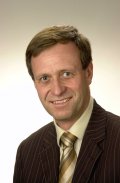|
Applications Keynote Speakers
|
Applied Image Science - From Consumers' Digital Files to Tangible Image Product
|
|

|
Dr. Fageth, CeWe Color
|
Abstract:
The market for picture capturing devices is booming and as a result, household penetration is increasing rapidly. In the traditional analogue market, prints from processed film were the only, albeit a very convenient, way of sharing and archiving memories in albums or in the famous shoebox. Nowadays innovative developments have given rise to new ways to view, share and archive images.
Image taking habits are also changing. People are afraid of not “capturing the moment” and nowadays pressing the shutter is not directly linked to cost as was the case with silver halide photography. This behavior seems to be convenient but can result in a dilemma for the consumer. This paper presents tools designed to help the consumer overcome the time-consuming image selection process while turning the chore of selecting the images for prints, or of placing them automatically into a photo book, into a fun experience.
The digital files processed by these tools originate from various sources. These files are transferred into a production process either in a modified or in their original state. The device origin might be a high resolution SLR camera or a low resolution mobile phone camera. The customer expects all of these images, regardless of source, to be printed in the perfect quality he/she is accustomed to from analog film processing. Customers often expect an even higher standard of quality due to the elevated retail price of DSCs. Digital photo services also offer the customer the option of a simple order process, enabling them to order a variety of image formats which cannot be printed on a single machine. Therefore, color management and the enhancement tools used on different types of machines play a very important role, especially with regard to online photo services which also offer products which do not necessarily have to be printed on light-sensitive photo paper, e.g. calendars, greeting cards, etc. These products are printed using different technologies, e.g. digital printers such as the hp Indigo or Xerox machines. The customer expects to receive both prints and personalized photo creations in exactly the same quality.
This paper will also describe how non-virtual products from pictures taken by digital devices can be implemented in the wholesale industry, regardless of image resolution and source, in order to fulfill the consumers’ requirements (delivery time and quality). The goal when selling these products is convenience and quality of the whole industrially finished product.
Bio:
Reiner Fageth studied electronic engineering at the Fachhochschule Heilbronn, Germany. He received a Ph.D. from the University of Northumbria at Newcastle, UK in split research with Telefunken Microelectronic and the Steinbeis Transferzentrum Image Processing in 1994. The major research topics there and also for the following years were industrial image processing systems based on classification using fuzzy logic and neural networks.
In 1998 he joined CeWe Color with the change to drive the analogue photo business into digital. First he was responsible for R&D and the production of consumers digital files on silver halide paper. CeWe Color is Europe largest wholesale photofinisher producing more than 3 billion prints a year.
Applications to transfer these files via the Internet, kiosk systems in retail shops and mobile applications have been developed and introduced successfully into the market. Recently digital services have been extended to more complex products such as photo books printed on digital presses. January 2007 he was appointed CTO of the company.
He is a member of the German DIN Normenausschuss Bild und Film NA 049-00-04 AA and has published over 30 technical papers.
|
The Workplace of the Future
|
|

|
Prof. Dr. Lutz Heuser (SAP AG)
|
Abstract:
The workplace of the future will support the user to cope with a flexible change of multiple processes and tasks. The actual work context is observed by the system and this will be utilized to support the user with relevant information as well as recommendations to proceed in his work. Interaction channelsand presentation means are chosen adaptively; needed knowledge and information is provided pro-actively and in direct context of the work performed. The user will have tightly integrated direct access to different services by mesh up techniques. He will ollaborate via informal social networks provided by various Web 2.0 services (e.g., forums, weblogs, wikis, and Xing). Domain experts will be identified automatically through an expert finder which is driven by social mining and advanced machine learning technologies. The user will be able to change the system by the use of end-user development facilities to adapt his working environment to his actual needs and specific environments. These methodologies and technologies have been investigated in a varying depth in the research community. However, only a proper combination will lead to the desired user experience. Knowing about the (business) processes the user is involved in supports this and will form the workplace of the future significantly. Business processes are not necessarily IT-based or IT-supported.
Bio:
Professor Lutz Heuser, Vice President SAP Research and Chief Development Architect at SAP AG, is responsible for the overall research portfolio management and the corporate venturing organization. His areas of expertise include collaborative business processes; ubiquitous computing and its integration into business applications; blended learning as part of corporate and non-corporate training; as well as security in corporate applications.
Professor Heuser joined SAP AG in 1999. Prior to his appointment at SAP AG, he was director of the European Research Organization at Digital Equipment Corporation and member of the extended executive board of the German subsidiary of Digital Equipment.
Professor Heuser serves on the advisory boards of imedia, Providence, FhG-Fokus, Berlin, and the D-Grid initiative.
Professor Heuser is a Visiting Professor at the National University of Paraguay and an Adjunct Professor of the Queensland University of Technology in Brisbane. In 2004, he was awarded an Honorary Professorship at the Technical University Darmstadt and in 2006 he became a member of acatech: the “Council for Engineering Sciences at the Union of the German Academies of Science and Humanities."
|

